Dorothy Carrington: The Dream-hunters of Corsica
Mazzeri, Finzioni, Signadori
Part 2: Mazzeri
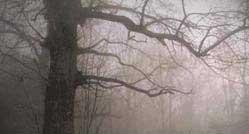
The activities of the mazzeri, as Dorothy Carrington believes, stem from an
epoch anterior to that of Homer, from the Corsican hunting and foodgathering
peoples of the pre-Neolithic times (before about 6000 B.C.)
The mazzeri are dream-hunters, who go out at night to kill an animal. They
recognize in the face of the animal someone known to him, nearly always an
inhabitant of his village. The next day he will tell what he has seen and the
person mentioned will die in the space of time running from three days to a
year, and always within an uneven number of days. If an animal is only wounded
by the mazzere, then the person it represents will meet an accident or illness,
but not death.
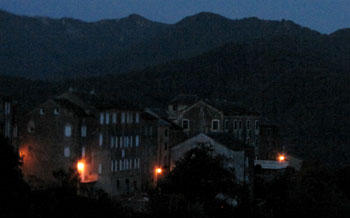
How to become a mazzere (mazzeru-man/mazzera-woman)?
It depends on
two factors: predisposition and initiation. To be a mazzere it is necessary to
have a psychic gift that opens the door to the parallel world. The origin of the
gift is mysterious, as is that of a gift for spiritual awareness that leads to
priesthood. Without such a gift no one can become a mazzere, for the initiation
takes place in dreams. The postulant is co-opted by a practiced mazzere who
"calls" him, to join him in a dream-hunt. Initiation take place most often in
adolescence. Mazzerisme runs in certain families.
What sort of people are they?
Very many mazzeri were women, so told
Jean Cesari, the friend who persuaded Dorothy Carrington and her husband to come
to Corsica.
They were usually armed with sticks and stones; in Corsica women
rarely carried firearms.
Mazzeri, it seems, have no animosity towards the
animal they have to kill, not towards the human being it represents. So they may
be shunned or even hated by their fellow villagers because they are thought to
bring death, they are peaceful enough in their daily waking lives. They are
uninterested in electoral and political rivalries; they never played any part in
the vendettas, holding their own, marginal position in Corsican
society.
Between themselves, men and women alike, they live on a footing of
equalitiy, regardless of distinctions of sex or social status.
According to
traditional popular belief a mazzere is a person who has been improperly
baptised, the priest or the godparents having omitted some word or gesture of
the ceremony.
Many mazzeri are known for their notorious piercing look, that
seems fascinating, rather than intimidating.
They recognize only the
Christian God and the undefined qualcosa, or quellu quassu: that wich is
above.
Mazzeri come from all walks of life. Roccu Multedo *) drawing on a wide
experience, maintains that the majority are shepherds, the people in Corsica who
live most in harmony with nature.
Most of those of whom Dorothy Carrington
heard, belonged to the class of small landowners that predominate in the
villages. But also mazzeri born into the ranks of village notables.
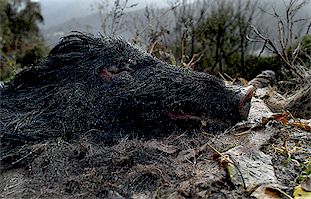
Which animals do they kill?
When the mazzeri go out at night their
purpose is to kill. Not people, but animals, any animal, wild or domestic.
Evidence suggest that they have a predilection for wild boar. These are very
numerous in Corsica.
But the mazzeri also kill pigs, goats, sheep, oxen,
bulls, cows and even dogs, though evidence on this last point is
contradictory.
The familiarity with animals apparent in the activities of the mazzeri is
inherent in Corsican tradition. The belief that human beings can take on the
forms of animals is characteristic of archaic rural societies, which have
retained an awareness of the animals hardly imaginable in the industrial world
of today.
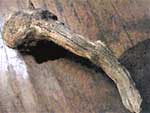
Which weapons are they carrying?
According to their own account the mazzeri go out equipped with a variety of the weapons known to the Corsicans in
their history and prehistory: guns, spears, axes, daggers, knives, sticks and
stones. The preferred weapon is a heavy staff or cudgel known as a mazza,
usually cut from the root and stem of a vine.
What is the origin of the word mazzeri?
The word mazzere may derive
from mazza, or equally from ammazza, meaning to "kill". In the village of Chera,
however, in the far southeast of the island, the only weapons used are knives,
if any are used at all.
In Chera and in some other parts of southern Corsica,
including the Alta Rocca, the mazzeri are known as culpadori, or colpadori,
from culpi, "to strike a blow". They go by other names in different parts of the
island.
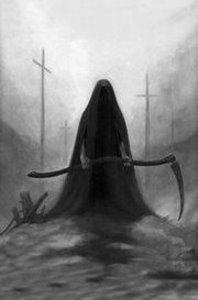
Everything belonged to the particular dream-world of the mazzeri; for their
dreams present a bewildering combi of the possible and the impossible.
Impossible usually are their methods of killing animals; yet their dreams
usually take place in recognizable country close to their homes, where they know
by name every pasture, mountain slope or pool or stream. Very often they hunt
near water. Water, giver of life, in traditional Corsica, surprisingly, was most
often regarded as evil.
Dorothy Carrington knew of only one mazzere, who
discovered unknown landscapes.
At all events, it does seem from collected
evidence, that mazzeri are believed to be able to travel further and faster in
their night hunting than they could possibly do in what is called "real
life".
Roccu Multedo maintains that certain mazzerireally go out at night, in a
state of trance, as is confirmed by two of the words used to describe them:
nottambuli: "night-walkers", and more significantly, sunnambuli:
"sleep-walkers". Some mazzeri, they go out into the maquis while others stay at
home dreaming they do so.
The Corsicans, including the mazzeri - or - colpadori have their own
explanation. The mazzeri do not go out at night in their physical bodies, but in
their soul or spirit; the word spirit is more appropriate because free from
Christian religious connotations. The spirits of the mazzere, when hunting, meet
the spirit of his victim, a human being who has assumed animal form. When he
kills the animal he severs spirit from body; the body lingers on for some time
afterwards, but this life is only a reprieve and inevitably the body will sicken
and die. The killing by the mazzere is therefore a symbolic act perpetrated in
the realm of dreams, or what the Corsicans define as "the other" or "parallel"
world, to which mazzeri have privileged access.
Mazzeri do not play any specific role in the traditional death ritual. For
them death has already occurred; in the maquis, in the dark, days or weeks or
months before.
Not all mazzeri are hunters. Marie-Madeleine Rotily Forcioli *) describes a
man of her acquaintance in southern Corsica, who died some forty years ago, who
was a practising mazzeru.
Exceptionally gentle by nature, he hunted neither
in real life nor in dreams. His dreams nonetheless often predicted malady and
death. Some of the mazzeru's dreams were violent. He found himself killing with
his bare hands. The gesture was symbolic, but he always recognized the victim as
someone known to him, usually a member of his village. That person invariably
died within a year. The mazzeru awoke from such dreams physically exhausted.
The two mazzeri Dorothy Carrington met, a man and a woman, and the mazzeru
known to Marie-Madeleine Rotily-Forcioli, experienced their dreams as imposed on
them by a superior power. They were, to use the Corsican expression, "called" to
hunt, "called" to kill; the order was absolute; they could not even choose their
victims.
Relations between mazzeri of the same village seemed to be friendly, if
casual.The intoxication of the mazzeri was their night hunting; what happened by
day was unimportant.
The relations of
mazzeri with those of other villages were on the contrary
hostile. Once a year, on the night between the
31th of July and 1st of August,
the mazzeri of each village organized themselves into a "
milizia", electing a
captain, and went out to fight the mazzeri of a neighbouring village; or rather,
they dreamed they did so. These
phantom battles, known as
mandrache, usually
took place on a mountain pass separating the two communities, f.i. the Col de
Vizzavona). The mazzeri carried their usual variety of weapons. The choice of
the asphodel as a weapon in the mazzeri's battle can be accounted for by the
plant twofold association with death (see article
The asphodel).
The outcome of these battles was premonitory. The mazzeri killed in combat were
condemned to die within a year; sometimes they were found dead in their beds on
the very morning of the next day . The village that lost most mazzeri would lose
more lives in the coming year than the opposing village of the victorious
mazzeri.
The inhabitants of the villages were deeply concerned by these
phantom
battles. On the
night of 31 July they would keep fires burning outside the
houses and in the church squares. It would seem that they were designed to ward
off the spirits of the dead, just as cutting implements were placed, that night,
on window ledges and above doorways.
The first day of August has been
described as an unofficial feast of the dead, analogus to All Souls' Day, on 2
November. But in fact it had a contrary significance.
(see Part 1).
The two
mazzere Dorothy Carrington has met, a man and a woman, as well as the
mazzeru portrayed by Marie-Madeleine Rotily-Forcioli, were people of a superior
cast of mind, inherently Christian and genuinely distressed by the nature of
their calling.
The mazzeru, known by Pierre Lamotte, maintained that all
great events, such as revolutions, epidemics, wars, are enacted in the
parallel,
spirit world before they take place in material reality. Man has no future, only
a timeless eternal past.
The mazzeru Dorothy Carrington met did not, in fact,
impress her by his expression, but this, she learned, was because he had
recently renounced mazzerism. He spoke in a deep rich poetic voice. He was
relieved to confide his memories. He had constantly hunting during the past
twenty years. Each time he had entered a landscape familiar to him only in his
dreams. Whereas the other mazzeri I knew of hunted, if they hunted at all, in
recognizable places close to their homes, and sometimes into the very streets of
their village, this mazzeru entered another country. It was grander, he said,
than Corsica. The mountains were higher; there were no trees. Huge rivers
crossed the land; one he followed until it disappeared into a tunnel through a
mountain. He walked around the mountain - no such feat was impossible in his
dreams - until he reached the spot where the river issued from the other side of
the range. He straddled it, planting a foot on either bank. He saw a hundred
children floating on its current; floating to their deaths. One he recognized as
René, a boy of his own village. He stooped and rescued him from the water. There
was an epidemic in the village and René was the only child not to die.
The mazzeru's dreams were full of unearthly wonders; but they were also
terrifying. This mazzeru had no taste for killing and he tried, if possible, to
save his victims. His situation was the more painful when members of his own
family were concerned. He said: "Once I had to kill a bull with a knife. Imagine
my horror when I recognized the animal as my poor father! I did no more than
strike it, and I withdrew the knife immediately. My poor father broke his leg,
was very ill, but recovered".
Not all his dreams were of hunting; but those in which no hunting took place
might be equally disturbing. Once he saw a close member of his family, for whom
he had great affection, surrounded by a group of fellow mazzeri. Did they intend
to kill him, even though his spirit had not assumed animal form? Before he could
discover their intentions he was abruptly woken by an accidental noise in his
house. It is said to be dangerous to wake a mazzere, that harm will ensue. This
was indeed what occurred. When the mazzeru returned to his dream he saw the same
gathering of mazzeri; but without his beloved relative. That person died within
a few days.
After this the mazzeru determined to free himself from his
dreams, they had become too oppressive, overwhelming him with guilt and remorse.
He felt a strong urge to reintegrate himself into the Christian religion:" I
preferred Jesus Christ" was how he defined his attitude. But the Catholic rites
of exorcism were no longer performed ( one of the ways to abdure mazzerism). He
found a Christian sect, who showed him charity and they rebaptised him,
according to his wish, and thereafter he ceased dreaming. He was
free.
Redeemed.
Today there are still some thirty mazzeri in the south of Corsica.
Photos Mazzere by the Spanish photographer Joan
Fontcuberta, who was so kind as to give his permission to use his photos from
the Exhibition about the Mazzeri, which took place in St.Florent, Corsica,
July 2003.
Legends & studies by Dorothy Carrington





